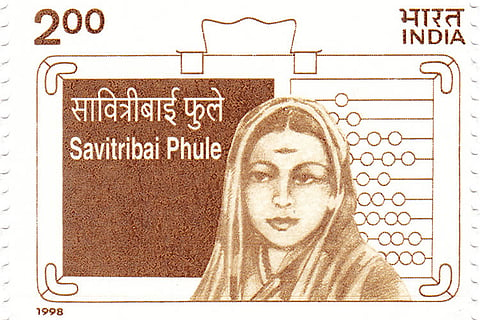

The following is the translation of an excerpt from an essay by Govindrao Ganpatrao Kale from the 1981 Marathi book Amhi Pahilele Phule. The book is a compilation of recollections narrated by Jotirao Phule’s associates and contemporaries, compiled by Pandharinath Patil and edited by Sitaram Raikar. Govindrao resided in the Phules’ house from 1881 to 1891. He first joined them as a student and then worked under Jotirao Phule as a clerk. This essay was written during 1928-1930.
This excerpt is about Savitribai Phule, whose 189th birth anniversary is being celebrated today.
It will take another independent biography to write about Savitribai Phule. The major credit of Jotirao’s success goes to Savitribai. She never showed a single trace of anger. She always had a smiling face and her laughter was restrained. People would fondly call her Kaku (aunt in Marathi). She would be elated when any guest visited their house and would cook special meals for them. She was very loving and kind. She not only helped spread education but also nourished people with her food. It was as if it was her mission to insist that visitors have meals.
Jotirao used to treat Savitribai with great respect. He used to call her “aho kaho”: using plural pronouns to indicate respect. Savitribai used to call Jotirao “Shetji”. There was true love between the couple. Tatya (Jotirao) would never do any work without Savitribai’s consent. She was very wise and farsighted.
When they got married, Jotirao was 11 years old while Savitribai was seven. Savitribai’s natal home was Zagadyachi Wadi near Pune. Her father was the chief of the village and was wealthy. He arranged a big wedding ceremony for his daughter. He had brought an elephant for the wedding procession. Savitribai was good-looking. She was respected by everyone. Especially after the proliferation of women’s education, educated women’s gratitude towards Savitribai had grown as she taught in the girls’ schools established by Jotirao. She would always give good advice to the girls and women who came to her. Some of Pune’s educated women would visit her.
Govindrao Ganpatrao Kale
A missionary woman (name not mentioned) used to reside in Pune. Her brother was once a viceroy of India. She would often visit Savitribai for discussions. She used to speak good Marathi. Pandita Ramabai and Dr Anandibai Joshi visited Savitribai two to three times.
A childhood friend of Jotirao, late Moro Vitthal Walvekar, would visit him regularly and the two would often talk on women’s empowerment. On Savitribai’s suggestion, Walvekar started Gruhini, a magazine dedicated to women’s issues. It published articles on women’s education and advocated equal status for women in society.
Kaku used to eagerly wait for the monthly copy of the magazine and read it with great interest. She would also send short articles for publication in the magazine. But she did not like writing under her own name. She would publish the articles under a pen name or under her friends’ names. She was not interested in receiving praise for her work. In spite of Jotirao’s insistence, she did not agree to be photographed. She was very fond of her women students. She used to reward them with academic books.
Some of Tatya’s cousins and nephews would go against him. But Savitribai did not harbour ill will against anyone. On festivals and special occasions, she would invite everyone home and host a meal. But sometimes Tatya didn’t like it. So, Savitribai would cook special meals and invite guests when he went out of station. When Tatya came to know of this, he would get slightly angry and ask, “What is this? Why are you spending so much on these people?” Savitribai would then laughingly answer that they were eating off his father’s money. Hearing this, Tatya’s anger would dissolve into laughter.
Cover of a 2018 edition of the book Amhi Pahilele Phule
Like Tatya, Savitribai used to dress simply. She did not wear ornaments: just a simple black chain and mangalsutra around her neck and a large bindi on her forehead. Every day she would get ready and complete the household work before sunrise. Her home used to be clean always. She would not tolerate any dust or litter in the hall. She was assisted by a woman and a man in the domestic work.
Savitribai herself used to cook. She was so dedicated that sometimes when Tatya called her, even if she was eating she would wash her hands and go to answer him. And when Tatya would come to know of this, he would feel bad and ask her, “Why did you leave your meal for me? I didn’t know you were eating.” Then Kaku would answer, “I came because you called me.”
I have witnessed these incidents. Savitribai would take great care of Tatya’s health and diet. Around 1888, when Tatya had paralysis, she nursed him with utmost care. It would not be an overstatement to say that it was due to her care that Tatya recovered from his illness.
Sonali Kale is a master’s student at the Centre for Political Studies, JNU. The great-granddaughter of Govindrao Ganpatrao Kale, she is associated with the Ambedkarite organisation BAPSA, JNU.